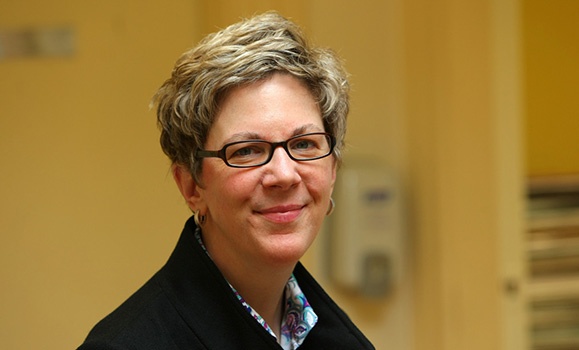On July 24 and 25, prideHealth Lunch & Learn sessions were held at the Halifax Infirmary and IWK Health Centre that focused on health concerns and issues of the LGBTQ2SIA+ communities.
Sponsored by prideHealth, a partnership between Nova Scotia Health Authority and the IWK Health Centre, along with Dalhousie University and the Nova Scotia Research Health Foundation (NSRHF), the sessions were standing room only.
Jacqueline Gahagan, professor, Health Promotion, Faculty of Health, coordinated the sessions.
“There is a need for greater awareness of health concerns and issues of the LGBTQ2SIA+ (Lesbian, Gay, Bisexual, Transgender, Queer, Two Spirit, Intersex, Asexual) communities among the general public as well as health care professionals,” says Dr. Gahagan. “By holding these sessions we can provide information and safe spaces to ask questions to help health professionals provide culturally competent care.”
Panelists were from AIDS Coalition of Nova Scotia, Dalhousie University (faculty and students), the Youth Project and NSRHF. They showcased different perspectives experienced in the LGBTQ2SIA+ communities, including gay men’s health issues, equitable housing, nutrition and body image, trans youth, queer birthing and research funding opportunities.
Sparking conversations
Research has shown that gay, lesbian and transgender people are less likely to see a doctor or health provider than other segments of the population — and that leads to poorer health outcomes. Dr. Gahagan adds that there are health issues specific to the LGBTQ2SIA+ communities such as a backlog for trans surgeries that health-care providers need to recognize and show sensitivity.
“We are hopeful that sessions like these will help close the gap towards gender equity in health care,” says Dr. Gahagan. “It is so important to keep having these conversations to help move us forward.”
There is a demand coming from health care providers for more LGBTQ2SIA+ information and local data. As a researcher herself, Gahagan hopes to encourage others to pursue health policy and research to ultimately help provide better health outcomes for the LGBTQ2SIA+ communities. She believes there is a need for more research particularly from the first voice.
“While we have a long way to go to resolve health issues facing the LGBTQ2SIA+ communities, we have the fortune to have three medical faculties on campus at Dalhousie – Medicine, Dentistry and Health that could make us leaders in LGBTQ2SIA+ health research,” adds Gahagan. “We should be at the forefront of developing innovative solutions and training the next generation of health care professionals.”
Bringing people together
Gahagan also spearheaded the development of the Queer Faculty Caucus this past winter, along with Catrina Brown, associate professor and graduate coordinator, School of Social Work. The caucus was created to build a sense of belonging and inclusion. It brings together faculty members from many disciplines to discuss LGBTQ2SIA+ issues on campus, including increasing content in courses and providing an academic support system for new or early-career faculty members. The caucus was derived from the Dalhousie Faculty Association’s Equity Council.
“Dalhousie has increased the visibility and emphasis on diversity and inclusiveness on our campuses in the past few years; however, we have more work to do to improve inclusion for LGBTQ2SIA+ communities including creating a more welcoming environment, addressing employment issues and course content,” adds Dr. Gahagan.
Plans are already underway to introduce regular LGBTQ2SIA+ sessions for health care providers throughout the year.

